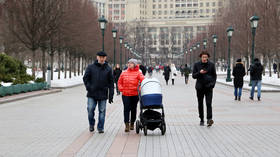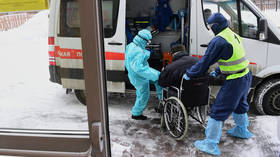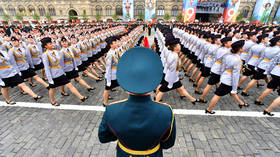Nearly half of Moscow residents now immune to coronavirus, officials say, as Russian capital mulls dropping ban on mass gatherings

Almost one in every two people living in Moscow has developed antibodies to Covid-19, the city authorities have announced, with curfew rules, and restrictions on bars and clubs having already been scrapped as the caseload falls.
Speaking as part of an interview with RIA Novosti published on Friday, Anastasia Rakova, the Russian capital’s Deputy Mayor for Social Development said, “We are systematically measuring the level of population immunity. Between 43 and 44 percent of Muscovites have antibodies, on average.”
“This is a fairly high figure,” she added, “and it allows the city to live an almost normal life with minimal restrictions.”
Also on rt.com Moscow mayor lifts ban on nightclubs and drops curfew for bars amid falling coronavirus cases across RussiaIn January, Moscow Mayor Sergey Sobyanin lifted an edict that had required bars, restaurants, and clubs to close their doors between 11pm and 6am to limit the number of potential contacts made by partygoers. That measure was among the last to have been retained since the start of the pandemic.
Defending the move, Sobyanin said, “The pandemic is on the decline, and in these conditions, our duty is to create conditions for the fastest-possible economic recovery, primarily in the most affected sectors of the consumer market.”
However, the mayor asked Muscovites to remember “that the likelihood of contracting the coronavirus, although reduced, still exists. The fight is not over yet. We still have to be careful.”
Russian Deputy Prime Minister Tatyana Golikova has been charged with handling much of the government response to Covid-19. At the beginning of March, she said that, while the situation was still “quite serious,” herd immunity would prevail across the country by the summer.
“If vaccination is carried out at the same pace as it is now, and the number of vaccination points remains the same, then the country will achieve collective immunity in August 2021,” she stated. After peaking at almost 30,000 cases a day in December, the daily diagnosis count has since fallen sharply in the past three months.
Moscow has been a hotspot for the virus since the pandemic began last March, and responsible for almost a quarter of confirmed cases, despite Muscovites making up only around 10 percent of the population.
Earlier this week, sources close to President Vladimir Putin told local media that a ban on mass gatherings could be relaxed in order to allow an annual military procession to go ahead with crowds of spectators. The Victory Day march is held in Moscow to commemorate the Soviet Union’s victory over Nazi Germany in the Second World War.
Think your friends would be interested? Share this story!














